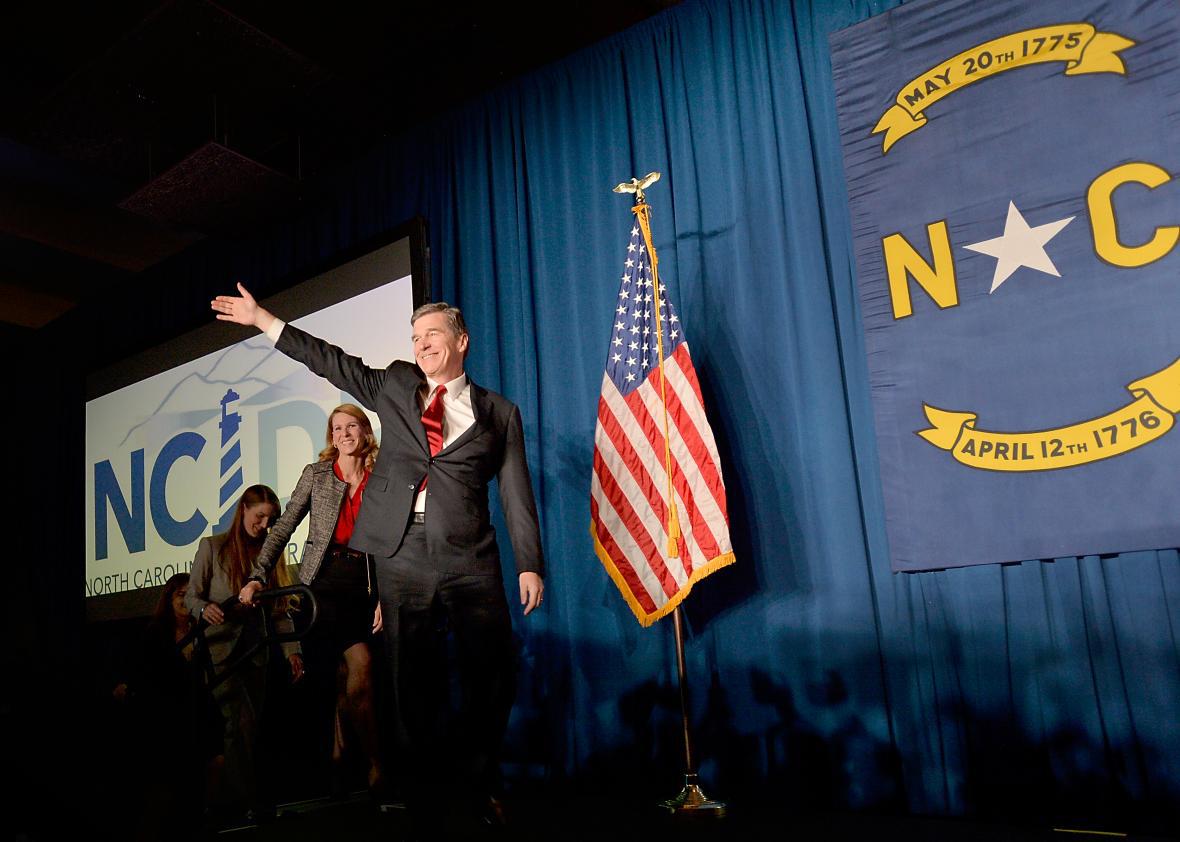Update, March 30, 2017, 4:20 p.m.: North Carolina Gov. Roy Cooper signed HB 142 into law.
On Wednesday, Republican leaders in the North Carolina General Assembly announced that they had reached an agreement with Democratic Gov. Roy Cooper to repeal the state’s notorious and costly anti-LGBTQ law, HB2. As soon as the “compromise” bill was revealed, however, LGBTQ groups lined up against it, arguing, in essence, that the cure would be worse than the disease. They are absolutely correct. The measure, HB 142, would be an unmitigated disaster for LGBTQ rights. It substitutes the old anti-trans policy for new, equally cruel one—and prevents cities from protecting their own LGBTQ residents. This bill is not a compromise. It is a capitulation.
To understand why HB 142, is so awful, consider what HB2 itself actually did. The legislature pushed through HB2 in response to a Charlotte ordinance that prohibited LGBTQ discrimination in the city. HB2 nullified this ordinance, and any other municipal law that provided greater protections than state law. Since state law doesn’t protect LGBTQ people, HB2 nullified all local LGBTQ nondiscrimination ordinances. More controversially, it also regulated the use of government bathrooms, including those in public schools and universities. Under HB2, individuals had to use the bathroom that corresponded to their “biological sex,” as listed on their birth certificate. In many states, it is difficult or impossible for trans people to alter their birth certificate. So this provision effectively bars countless trans people from using government bathrooms.
HB 142 would repeal HB2 in its entirety—and replace it with something just as odious. The bill forbids “state agencies, boards, offices, departments, institutions,” and “branches of government,” including public universities, from regulating “access to multiple occupancy restrooms, showers, or changing facilities.” It applies this same rule to “local boards of education,” meaning these boards cannot pass trans-inclusive policies. Instead, local governments, public universities, and school boards would have to wait for permission from the General Assembly to protect trans people. Of course, the heavily gerrymandered, vehemently anti-trans, Republican-dominated legislature will almost certainly never grant this permission.
That’s not the end of it. HB 142 would also impose a years-long moratorium on local LGBTQ nondiscrimination ordinances. The bill would bar any city from “regulating private employment practices or regulating public accommodations” until December 1, 2020. There is nothing to stop the General Assembly from extending this moratorium as its expiration date draws closer.
HB2’s fiercest critics have already come out strong against HB 142. The Human Rights Campaign, Equality North Carolina, Lambda Legal, and the ACLU all oppose the bill, arguing (accurately) that it enshrines anti-trans discrimination without providing any significant benefits. They’re right. The bill would leave trans North Carolinians in a state of limbo, without any clear legal protection, at a time when they have been placed at the center of a political firestorm. North Carolina’s trans community has never been more vulnerable than it is now. The collective ire of the anti-trans movement is bearing down upon them. And HB 142 would legitimize the deprivation of their rights under the banner of bipartisanship.
Speaking of: While HB 142 was apparently concocted by Republican legislative leaders, Cooper will own this failure if he signs the bill into law. The dynamic here is obvious. Once Cooper became governor, he owned the economic hardship caused by HB2, politically speaking. He ran, and won, on a platform of repealing HB2. And once in office, his incentive to repeal the law by any means necessary vastly outstripped his incentive to repeal it the right way. This week also delivered an economic one-two punch: The Associated Press estimated that HB2 could cost the state $3.76 billion over a dozen years, and the NCAA announced that it would ban events in the state through 2022 if the bill were not repealed.
Wary of the inevitable political fallout that would land on his shoulders, Cooper got desperate—and got played. In fact, he struck a deal that is far worse than the one that North Carolina Democrats refused to support in December. The December compromise bill included a moratorium of 180 days; HB 142 contains a moratorium of more than 1300 days. Cooper reached this “compromise” late in the day behind closed doors, and allowed the bill to be rushed through the legislature at breakneck speed, just like HB2. Actually, it’s even more procedurally egregious: HB 142 was originally an occupational licensing bill that had already passed the House; to limit the number of votes required, senators gutted the text and replaced it with HB2 “compromise.” No wonder ousted Republican Gov. Pat McCrory supports HB 142! If Cooper signs it, he will become the new face of North Carolina’s anti-trans laws, setting the stage for the bitter McCrory to stage a comeback in 2020.
At a Thursday morning Senate Rules Committee hearing on HB 142, the lead plaintiff in the lawsuit against HB2, Joaquin Carcaño, spoke out against the “compromise” bill. “Lawmakers,” he said, “are choosing basketball over transgender rights.” That neatly captures the catastrophe transpiring in North Carolina today. Forced to choose between a principled defense of trans rights and short-term political gain, Cooper picked the latter. In the process, he betrayed the voters who cast a ballot for him because he championed LGBTQ rights. And what will he get in return? Basketball and optics? North Carolina deserves better than this. And no backer of HB 142 should continue to pretend that they value trans lives over cheap politics and decent publicity.
Additional reporting by Lily Carollo in North Carolina.
